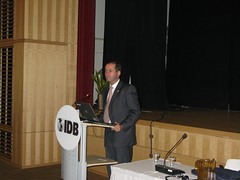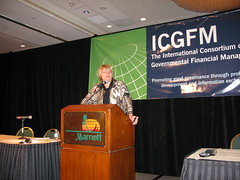
Liv Apneseth Watson, Senior Executive,
IRIS Business Services described XBRL. She explained how XBRL is changing financial reporting in the public sector. XBRL is not about technology, according to Ms. Watson, it is about solving major data problems. XBRL is, fundamentally, an electronic language that helps both the private and public sector effectively and efficiently bridge the current gap between business systems by crossing artificial boundaries. She challenged the audience to consider the amount of re-keying of financial data done today and the difficulty in finding business information on the Internet.
Ms. Watson said that XBRL is like universal bar codes but for financial reporting. Compelling reasons for XBRL:
- Making financial and business information exchange better, faster, and cheaper
- Making financial reporting more transparent and discoverable
- Explicitly articulating business meaning and thus enabling the exchange of that meaning between humans or between business systems
- Improving data integrity
- Integrating business systems
- Saving government agencies money and making them more efficient
She described the problem in the SEC in the United States to find financial information. Businesses provide this information, but the SEC cannot find the appropriate information. The FDIC in the United States was able to increase the accuracy of data from 64% to over 90% by using XBRL.
XBRL is tagged data that is machine readable. It is a standard way to communicate business and financial information. XBRL is an open source international standard operated by a non-profit consortium. It is more than financial reporting. It provides a global business reporting supply chain. Machine readable makes data re-usable.
Ms. Watson described how XBRL provides more functionality than previous methods. XBRL uses" hyperlinks on steroids," according to Ms. Watson. She described the taxonomy of an XBRL item. The presentation element of XBRL enables translating labels to multiple languages. This reduces the cost to report in multiple languages.
The methods for calculating business and statistical information can be linked to the XBRL item. This means that the information will be presented based on national or international standards. XBRL can also help identify mathematical errors in financial reports. She also described XBRL in context to spreadsheet applications. XBRL has the intelligence to label, identify context and show formulas eliminating "Excel hell". Anyone with data locked with proprietary systems will be at a disadvantage compared to those with open discoverable data, according to Ms. Watson.
Many governments have adopted XBRL. Her presentation described:
- Macedonia reporting portal
- International Accounting Standards Board
- Securities and Exchange Commission - USA
- Federal Deposit Insurance Organization - USA
- Committee for European Securities Regulators
- State of Nevada
Ms. Watson showed a live demonstration of a sample XBRL database. She switched languages to French and Chinese. Therefore, organizations that adopt XBRL are fully compliant with international standards. Ms. Watson believes that XBRL can make countries more competitive.
XBRL will enable the
semantic web and
linked data, according to Ms. Watson.
Liv A. Watson heads Global Business Development for IRIS Business Services Private Limited. She is one of the founders of the XBRL Intentional Consortium. She is the co‐author and contributor author to several of books including “
XBRL for Dummies” and Governance, Risk, and Compliance Handbook published by Wiley.
Ms. Watson suggested the following links for more information:
 Jason Levergood, Senior Manager at Grant Thornton LLP, provided an overview of the ICGFM Worldwide Survey, Public Financial Management Responses to an Economically Challenging World on December 7th. at the ICGFM Winter Conference. Public financial managements from over 50 countries were surveyed in 2010.
Jason Levergood, Senior Manager at Grant Thornton LLP, provided an overview of the ICGFM Worldwide Survey, Public Financial Management Responses to an Economically Challenging World on December 7th. at the ICGFM Winter Conference. Public financial managements from over 50 countries were surveyed in 2010.











